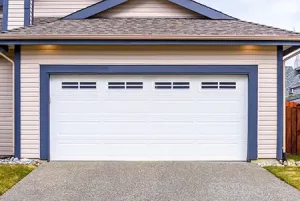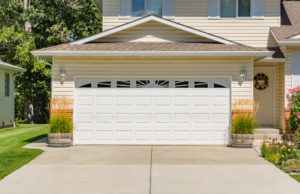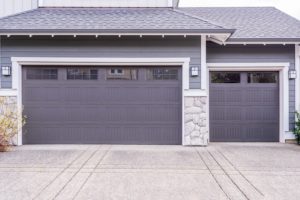A broken garage door spring can be frustrating for the entire household. It could mean getting stuck outside in the cold or rain or making it hard to go to work. A garage door is essential to a home’s function and can be an inconvenience when it doesn’t work. So, how can you handle a broken garage door spring? Will it require a garage door spring replacement? Read on to learn more about the different types of garage door springs and causes of garage door spring breakage.
Types of garage door springs
There are two types of garage door springs, and both are reliable but are designated for different types of garages. They include:
- Torsion springs
Torsion springs are the most common door springs on the market. This type of spring uses its torque to help it open and close a garage door. It is sturdy and lasts longer than other types of garage door springs. Torque is basically a twisting force that produces rotation. When a door closing or opening force is applied, either by motor or hand, the coil twists and then coils on the shaft.
Torsion springs are available in different sizes and lengths. The spring that is used is usually determined by the opening dimensions and size of the garage door. There are two types of torsion springs: a standard torsion spring and a torque master torsion spring. The former is more common and is mostly found in residential buildings. It is usually mounted above garage doors, and its metal shaft supports the torsion springs. Lighter garage doors use this kind of torsion springs. The latter is the safest one of them. The springs are always enclosed in the torsion shaft. A torsion rod also holds the spring in place.
- Extension springs
Extension springs extend as the name implies. It is usually found in the horizontal, upper tracks on the different sides of the garage door. It is used where there is not enough headroom, and it is almost impossible to use a torsion spring.
For a garage door to open, the spring extends and creates a counterbalance that supports the door. When the door is opened wider, the spring extends further as more force is applied to the extension springs.
Safety measures are required because of the force these springs handle. Most times, garage door springs are paired with safety cables. In case there is any malfunction, and the extension spring manages to break free, this safety cable will stop it from shooting out freely as it could cause serious injury. It also protects the homeowner if a bracket or cable fails. There are a few types of extension springs, and they include open looped, double looped, and clip ends extension springs.
Open looped springs are a lot easier to change as it does not require any disassembling of the pulley before it can be replaced. The double looped spring is stronger than the former, and it comes with two coils at the end of the spring connected to the pulley and the eye bolt. The clip ends spring is the strongest of all three. It comes with a longer and better service life because the clips do not place much pressure on the spring.
Both springs have their advantages and disadvantages. For instance, torsion springs last longer than extension springs. It is also able to control the garage door’s movement better than the latter. When it comes to safety, torsion springs are better as they do not break and fly off to damage property or cause injury. If extension springs lack a safety cable, they could cause severe damage if the spring breaks.
Also, torsion springs have only a few exposed parts, and this makes it safer. It also makes the operation of the garage door smoother. Extension springs are less expensive and are mostly found in residential homes. Despite being more affordable, they do offer more functionality. The main reason why people prefer to use extension springs is cost. It is a lot cheaper than torsion springs. The similarity between the two is that they both coil and recoil under tremendous pressure. This implies that proper maintenance is required to keep them working in optimum condition no matter what door spring you have.
What causes the springs to break?
If you start to hear sounds in your garage door or the door cannot be lifted using the emergency rope, there is a high probability that the spring is broken. In this case, you will need a garage door spring replacement. What can cause it to break? The common culprits are rust, wear and tear, and lack of maintenance.
- Normal wear and tear
Many people expect garage door springs to last forever, but this is not reality. Every machine that has moving parts will experience wear and tear. The singular act of closing and opening the door several times in the day makes it even more susceptible to wear and tear. Even though door springs are built for that purpose, it is a tough process. Some springs last for an extended period, though they won’t last forever. A regular garage door is rated for around 10,000 cycles in total. So it depends on how often the door is used and not necessarily how old it is. When this usage amount is surpassed, you will need to replace the garage door springs as they will start to decline in functionality.
The constant wear and tear of continuously closing and opening a garage door breaks it down, increasing the need for garage door spring repair services.
- Rust
Generally, garage door springs are built with metal, and this means that rust is its enemy. Rust can build up on the springs as time passes, and when this happens, the lifespan of the springs will be reduced significantly. As it works, rust reduces the surface friction amount when the springs move from front to back and vice versa. It eventually weakens the coil on the door. This action impacts the wear and tear process faster than normal. It is possible to fix the problem by contacting garage door spring repair experts who know the best anti-rust solutions to use. It could go a long way to prevent rust from taking over the spring.
- Poor maintenance
Most garage doors do not need extensive maintenance. While garage door springs will wear and tear, the rate of decline can be reduced by regular maintenance. In the same vein, maintaining the garage door spring regularly makes it easier to spot potential wear signs before a significant issue can arise.
It is ideal to check your garage door yearly. To do it, lift the door halfway and let it go. If your garage door springs are working correctly, the door will remain still. However, when the springs are weaker than normal, the door may begin to fall or sag. Proper maintenance can also prevent issues like rust. This can preserve garage door springs and make them last longer.
Do you need a garage door spring replacement?
Both types of garage door springs have a lifespan of around 7 to 9 years. However, the level of usage may determine if it will wear out faster. How will you know when you need a garage door spring replacement? Here are some things to look out for:
- Loud noises in the garage
If you hear a loud bang that makes you think someone is banging on the garage door, it could be a problem with the spring. The sound could be coming from the unwinding of the spring.
- Torsion spring gaps
A gap in the torsion spring is a way to determine if it is broken. Look out for a gap in the central part of the torsion spring.
- Bent garage door top
When a door spring is broken, it may make the garage door bend at the top. The reason for this is the immense pressure on the mechanism to lift without a spring.
- Dropping garage door
Garage doors are heavy, and the spring helps them shut gently. Without a working spring, the door’s entire weight could come crashing down at a quick pace.
- The emergency rope doesn’t work
Garage doors have emergency ropes that hang from the opening mechanism. If the springs are broken, the door won’t open if the rope is pulled.
- Jerky garage door movement
Sometimes, when a spring is broken, the mechanism may still be able to lift the door, but it won’t carry it smoothly. This can cause jerky movements.
- Crooked door
If only one spring on the side is broken, it will cause a crooked movement as the door moves up the track.
A garage door repair company can fix a broken garage door spring and provide garage door maintenance and inspection services.
Conclusion
There are two types of garage door springs, namely torsion and extension springs. They have a lifespan of around seven years, but this varies depending on its use. The lack of maintenance, rust, and wear and tear can cause your garage door spring to develop issues. Even though wear and tear is inevitable, routine maintenance can keep it in top shape so that your garage door lasts longer.
Do you need garage door spring replacement, call us today!



